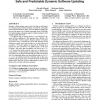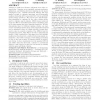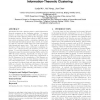1878 search results - page 319 / 376 » Feature Generation Using General Constructor Functions |
151
Voted
WSDM
2012
ACM
13 years 9 months ago
2012
ACM
We present a new approach for personalizing Web search results to a specific user. Ranking functions for Web search engines are typically trained by machine learning algorithms u...
227
Voted
POPL
2005
ACM
16 years 2 months ago
2005
ACM
Dynamic software updates can be used to fix bugs or add features to a running program without downtime. Essential for some applications and convenient for others, low-level dynami...
112
Voted
WWW
2004
ACM
16 years 2 months ago
2004
ACM
We present a question answering (QA) system which learns how to detect and rank answer passages by analyzing questions and their answers (QA pairs) provided as training data. We b...
138
Voted
KDD
2008
ACM
16 years 2 months ago
2008
ACM
Learning to rank from relevance judgment is an active research area. Itemwise score regression, pairwise preference satisfaction, and listwise structured learning are the major te...
129
Voted
KDD
2008
ACM
16 years 2 months ago
2008
ACM
Information-theoretic clustering aims to exploit information theoretic measures as the clustering criteria. A common practice on this topic is so-called INFO-K-means, which perfor...



